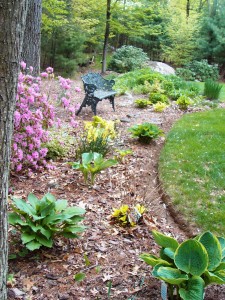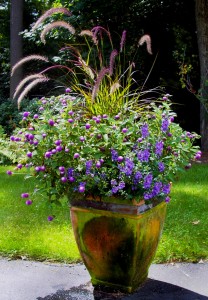Gardening Talks
Thirteen years ago as a District Director for the Garden Club Federation of Massachusetts (GCFM), I found myself in the position of having to find someone willing to do a container gardening program for a district luncheon. The goal of the meeting was to pay for the District’s project, so I ended up doing the program myself. Afterward, several attendees asked me if I could speak at their clubs. Except for a hiatus while I served as First Vice President and President of GCFM, I’ve been on the circuit ever since.
I limit myself to about 30 presentations each year for garden clubs, civic and charitable groups, and companies. I chose that number because I want every talk to sound and be fresh. Also, I refresh each presentation every year to keep up with the evolving science of horticulture and the environment. I’ve heard speakers who are on the road three days a week and, whether they want to acknowledge it or not, it shows in their level of enthusiasm and presentation skills.
My fee for the 2020-2021 season is $300 per presentation. I do not charge for mileage if the engagement is within an hour (40 miles) of Medfield, Massachusetts. For presentations that require materials (container gardens) I add in the expense of materials at my cost. Everything I create during a presentation belongs to the sponsoring group.
Below is a synopsis of the programs I offer. If the topic you’re interested in isn’t on the list, please feel free to ask me if I feel qualified to speak on the subject. Except as noted, all programs are available year round (except January, when my husband and I travel). Lectures are illustrated by PowerPoint slides and all presentations include extensive handouts. You can contact me at betty02052 (at) gmail (dot) com.
Dirt on your Hands, Soil in the Garden — the secret behind a green thumb is often the most overlooked aspect of gardening—the soil we plant in. Few of us start with great soil, but we can all build it. By using gardening methods which improve rather than deplete the soil, with an emphasis on turning kitchen and garden waste into compost, the ‘Black Gold’ of gardens, I will show you how you can create great gardens from the ground up.
 Going Native: Low Maintenance Trees and Shrubs — Native trees and shrubs evolved in New England without our help. They have adapted to hot, dry summers and cold winters, to browsing deer, and local insects. The flowers and fruit they produce attract birds and butterflies, and along with their foliage add color to your landscape. Nativars—the cultivars of native plants—have expanded the color palette and options for the homeowner. I also offer a program on native perennials.
Going Native: Low Maintenance Trees and Shrubs — Native trees and shrubs evolved in New England without our help. They have adapted to hot, dry summers and cold winters, to browsing deer, and local insects. The flowers and fruit they produce attract birds and butterflies, and along with their foliage add color to your landscape. Nativars—the cultivars of native plants—have expanded the color palette and options for the homeowner. I also offer a program on native perennials.
Life Cycle Gardening: Gardening for a Lifetime — Have you lived with the same plantings for many years and now found they don’t fit the way you want to live anymore? Gardens should never be a burden to us. What we want in our 20’s and 30’s is not what the same as we want in later years. Reconfiguring your garden for new uses as your family grows and your life and interests change, makes sense and may be less work than you thought. You’ll learn how to keep your gardens as your needs and abilities change. It’s a matter of plant selection and design, and will enhance your garden enjoyment for years.
Shade Gardens — Shade is a fact of life in New England. I’ll show you a world of colorful plants that can make your garden bright, and beautiful and make you learn to love your shade.
Healthy Lawns, and Lawn Alternatives — How much lawn to do you use? Do you need? What can you do with the rest of your property? You can care for your lawn with minimal environmental impact without breaking the bank. Finally we examine lower maintenance alternatives to our lawns. Myths, rumors and lawn service industry propaganda debunked.
Indoor Gardening—Making Your Houseplants Thrive — We all need greenery to get us through New England winters. Keeping houseplants growing and flowering in your home is not as difficult as you may believe.
Vegetable Gardening – Tips for a Better Garden — The secret to a great garden is in the planning, none more so than the vegetable garden. If you start early and make choices wisely, you can enjoy a summer’s worth of vegetables with plenty left over for storing or sharing. Your vegetable garden can be a fun and healthy choice as you make the decisions about what to grow and how you want them grown.
Fragrance in the Garden — Presented with flowers, most of us immediately inhale deeply. But not all flowers are fragrant. You will explore a wide variety of annuals, perennials, tree and shrubs that deliver on the promise of wonderful scents as well as beauty, and learn why a “rose is not always a rose to the nose.”
Birds, Bees and Butterflies — Bring song, beauty and pollinators to your garden by including plants designed to attract them. There’s no better way to wake than to birdsong and no better insecticide than a hungry bird. Butterflies and bees are active pollinators and a source of beauty. A few carefully selected plants are all you need to make your garden a better environment for you, your plants and the world we share.
Water Smart Gardening —New England average 40 inches of rain a year, but that doesn’t mean it comes when you need it. Whether your problem is too much water in the wrong place or getting the most from what rain falls during a dry summer; good gardening techniques, a little planning and some new takes on old wisdom can make you a water smart gardener.
Rain Gardens—City, country and suburban gardeners can all find themselves with too much water in the wrong place after rain storms or when the snow melts. Rain gardens are a practical and ecologically sound way to solve the problem. In your landscape a rain garden looks like any other garden bed, but it’s special construction means it absorbs unwanted water, putting it to good use for you and the environment.
Wrapping Up Your Garden— It’s fall and time to button up for winter. I offer a four step program built around ‘must do’s’,’ should do’s’, ‘could do’s’, and ‘don’t do’s’ that ensure your garden gets off to a great start next spring.
Demonstration programs:
 Container Gardening — Demonstration (program available May through September) Whether it’s annuals, perennials, vegetables or tropicals, containers give you the versatility and freedom to do it all. You will learn techniques for exciting and successful containers from the bottom up as I assemble five containers during this lecture and demonstration. Then your club can choose to auction or raffle them off.
Container Gardening — Demonstration (program available May through September) Whether it’s annuals, perennials, vegetables or tropicals, containers give you the versatility and freedom to do it all. You will learn techniques for exciting and successful containers from the bottom up as I assemble five containers during this lecture and demonstration. Then your club can choose to auction or raffle them off.